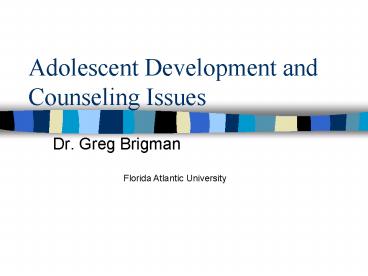Adolescent Development and Counseling Issues - PowerPoint PPT Presentation
1 / 26
Title:
Adolescent Development and Counseling Issues
Description:
Personalizing typical concerns and implications for counseling adolescents ... Aquiring values that are harmonious with an approriate scientific world picture ... – PowerPoint PPT presentation
Number of Views:151
Avg rating:3.0/5.0
Title: Adolescent Development and Counseling Issues
1
Adolescent Development and Counseling Issues
- Dr. Greg Brigman
Florida Atlantic University
2
Introduction
- A developmental perspective
- Typical adolescent concerns
- Implications for counseling
3
Agenda
- A developmental perspective
- Typical concerns/issues for adolescents
- Counseling implications
- Discussion of reading
- Personalizing typical concerns and implications
for counseling adolescents - Discuss progress on presentations
4
Primary source for presentation is Vernon (1993).
Counseling Children and Adolescents
5
A Developmental Perspective
- Three key theorists
- Havighurst--Developmental tasks
- Erickson--Psycho/social stages of development
- Maslow--Hierarchy of needs
6
Havighurst--Developmental Tasks of Adolescence
- Accepting physical makeup and acquiring a
masculine or feminine sex role - Developing appropriate relations with age mates
of both sexes - Becoming emotionally independent of parents and
other adults - Achieving the assurance that one will become
economically independent - Determining and preparing for a career
7
Havighurst--Developmental Tasks of Adolescence
- Developing the cognitive skills and concepts
needed for academic, social, and career
competence - Understanding and achieving socially responsible
behavior - Preparing for marriage and family
- Aquiring values that are harmonious with an
approriate scientific world picture
8
Ericksons Stages of psychosocial development
- Two stages associated with adolescence
- Industry vs Inferiority ( ages 6-12)
- aquiring skills and completeing tasks
- developing sense of competence
9
Two stages associated with adolescence
- Identity vs Role Confusion ( ages 13-19)
- integrating social roles, emerging sexual
feelings, and a sense of who they have been up to
this point in their lives - determining an occupation and developing values
and vision for future
10
Maslow Hierarchy of Needs
- Physiological--hunger, thirst, shelter
- Safety--security, protection, structure, limits,
freedom from fear and anxiety - Belonging and love--feeling accepted and wanted
11
Maslow Hierarchy of Needs
- Esteem and respect--recognition by others of
competence and accomplishments - Self-actualization and cognitive
understanding--recognizing ones unique potential
(this stage usually not accomplished during
adolescence)
12
Typical Issues and developmental concerns
- 11-14 year olds
- Fear of unknown concerning sexuality
- Fear of being unpopular
- Fear of being selected first (having to lead a
team or group)
13
11-14 year olds
- Fear of being selected last (implying being
disliked or unpopular) - Fear of not being able to complete homework,
schoolwork, prokect - Extreme concern over emotional happiness/unhappine
ss
14
15-18 year olds
- Fear of sexuality (based on lack of information
concerning sex) - Fear that another peer will vie for the person
they are dating - Fear of being ridiculed in class when asked to
speak or demonstrate
15
15-18 year olds
- Fear that adults will interpret roles for them
(they seek to define themselves in relation to
peers and their own values and goals) - Fear of inadequate vocational or academic training
16
Manifestation of typical concerns
- Alcoholism drug abuse
- Depression, anxiety, anorexia, suicide
- Lack of self control, irresponsibility,
absenteeism, violence
17
Counseling Implications
- Developmental goals (ASCA)
- Gaining self awareness
- Developing positive attitudes
- Making healthy choices and effective decisions
18
Developmental goals (continued)
- Respecting others
- Gaining responsibility
- Developing relationship skills
- Resolving conflicts
19
Counseling Implications
- Change process
- Learning style
- Brief counseling
20
Change process
- Planning
- Implimentation
- Evaluation
21
Planning Stage
- Exploring and defining problem
- Need for Safe environment
- Developing trust
- Five steps of planning stage
- Designing the intervention
- Vernons 17 tips
22
Implementation Stage
- Trial implementation-homework
- Step by step implementation
- Full implementation
23
Evaluation Stage
- Checking for results
- Recycling process
- Continuous and in flight adjustments can be made
24
Learning style
- techniques that emphasize other than verbal-talk
therapy are needed to address different learning
styles - art therapy, imagery, bibliotherapy, psychodrama,
role play, music, games, activities, computers.
P.56-65
25
Brief Counseling
- Focus is on problem solving
- Problems are taken at face value vs symptom of
some deep and fundamental deficit in the student
or family - Interventions attempt to interrupt old responses
and provide new ways of responding to presented
difficulties.
26
Personalizing typical concerns and implications
for counseling
- Students recall their early and middle
adolescence and reflect on typical concerns and
implications for counseling adolescents

